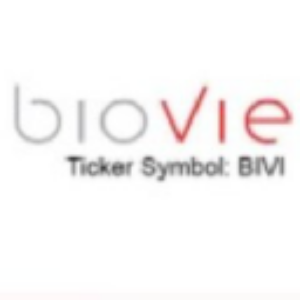BioVie Enrolls First Patient in ADDRESS-LC Clinical Trial Assessing Novel Anti-Inflammatory Candidate Bezisterim for the Treatment of Neurological Symptoms Associated with Long COVID
Rhea-AI Summary
BioVie (NASDAQ: BIVI) has initiated patient enrollment in its Phase 2 ADDRESS-LC clinical trial evaluating bezisterim (NE3107) for treating neurological symptoms of long COVID. The trial, funded by the U.S. Department of Defense, is a randomized, placebo-controlled study focusing on patients with cognitive impairment and fatigue. Topline data is expected in the first half of 2026.
Long COVID affects approximately 20 million adults in the US, with 10-30% of COVID-19 patients experiencing persistent symptoms. The study aims to address the lack of approved treatment options for long COVID patients suffering from debilitating fatigue and brain fog. Bezisterim targets key neuroinflammation mechanisms and has shown potential in reducing chronic symptoms in Alzheimer's and Parkinson's disease trials.
Positive
- Trial is fully funded by U.S. Department of Defense grant, reducing financial burden on the company
- Addresses large market opportunity with 20 million affected adults in US alone
- Builds on previous positive results from Alzheimer's and Parkinson's disease trials
- Targets unmet medical need with no currently approved treatment options
Negative
- Results won't be available until first half of 2026, indicating long development timeline
- Success in previous neurodegenerative disease trials doesn't guarantee efficacy in long COVID
- Faces challenges in treating poorly understood condition with complex pathogenesis
News Market Reaction
On the day this news was published, BIVI declined 4.55%, reflecting a moderate negative market reaction.
Data tracked by StockTitan Argus on the day of publication.
Despite growing recognition of long COVID as a serious condition, diagnosed patients have no approved treatment options, with many suffering from debilitating fatigue and brain fog
Evidence suggests sustained inflammation plays a central role in the pathogenesis of long COVID, particularly in the associated cognitive dysfunction and other neurological symptoms1
Bezisterim targets key underlying mechanisms of neuroinflammation, and has demonstrated the potential to reduce chronic symptoms in Alzheimer’s disease and Parkinson’s disease trials thought to be driven by neuroinflammation
CARSON CITY, Nev., May 15, 2025 (GLOBE NEWSWIRE) -- BioVie Inc. (NASDAQ: BIVI), (“BioVie” or the “Company”), a clinical-stage company developing innovative drug therapies for the treatment of neurological and neurodegenerative disorders and advanced liver disease, today announced first patient enrollment in the Phase 2 ADDRESS-LC clinical trial (NCT06847191) evaluating bezisterim (NE3107) for the treatment of neurological symptoms associated with long COVID. The Company anticipates topline data to be available in the first half of 2026.
Long COVID affects approximately 20 million adults in the US, and millions more worldwide.2,3 Studies estimate that approximately 10
“Bezisterim has demonstrated the ability to modulate key inflammatory pathways implicated in the chronic inflammation seen in long COVID, that also play a key role in neurodegenerative diseases of aging, like Parkinson’s and Alzheimer’s. By reducing neuroinflammation and addressing potential metabolic dysfunction, our hope is that bezisterim may have the potential to help patients with long COVID,” stated Cuong Do, BioVie’s President and CEO. “This trial will explore whether targeting these mechanisms can help restore normal function and improve quality of life for individuals affected by the neurological symptoms of long COVID, and we look forward to sharing our findings in the first half of 2026.”
The Phase 2 ADDRESS-LC study, which is fully funded by a grant from the U.S. Department of Defense (DOD), is a randomized (1:1), placebo-controlled, multicenter trial evaluating the efficacy, safety and tolerability of bezisterim in adult participants with long COVID who have cognitive impairment sequelae and fatigue. Individuals who have been diagnosed with long COVID and have neurocognitive dysfunction and self-reported fatigue may meet qualification criteria and can visit www.addressLC.com to learn more.
“Long COVID remains a significant and poorly understood health challenge, with many patients experiencing persistent neurological and systemic symptoms long after their initial infection. Emerging evidence suggests that sustained inflammation plays a central role in the pathogenesis of long COVID, particularly in cognitive dysfunction and other neurological impairments,” stated Lindsay McAlpine, MD, BSc, a neuroimmunologist in the Division of Neurological Infections and Global Neurology at the Yale University School of Medicine. “SARS-CoV-2 proteins have been shown to persist in the body. We know triggered inflammatory pathways resulting from a SARS-CoV-2 infection can affect the blood-brain barrier, leading to prolonged neuroinflammation and associated symptoms. Given that variants in these pathways have been linked to severe and long-lasting cases of long COVID, there is a pressing need for targeted interventions that can disrupt this inflammatory cascade.”
About Long COVID
Long COVID is a condition in which symptoms of COVID-19, the acute respiratory disease caused by the SARS-CoV-2 virus, persist for an extended period, generally three months or more. Common symptoms include lingering loss of smell and taste, extreme fatigue, and “brain fog,” though persistent cardiovascular and respiratory problems, muscle weakness, and neurologic issues have also been documented. Approximately 20 million individuals in the U.S. currently or previously have long COVID, with millions more impacted worldwide.2,3 The loss in quality of life and earnings and increased medical costs has an enormous economic impact estimated to be
About Bezisterim
Bezisterim (NE3107) is an orally bioavailable, blood brain barrier-permeable, insulin-sensitizer that is also anti-inflammatory. In addition, it is not immunosuppressive and has a low risk of drug-drug interactions. By binding to ERK and selectively modulating NFκB activation and TNF-α production, BioVie believes that bezisterim may offer clinical improvements in several disease indications, including Parkinson’s Disease (“PD”), Alzheimer’s Disease (“AD”) and long COVID.
In Parkinson’s disease, BioVie is currently enrolling patients in the Phase 2 SUNRISE-PD clinical trial evaluating the safety and efficacy of bezisterim on motor and non-motor symptoms in patients who have not been treated with carbidopa/levodopa, with topline data expected in late 2025 or early 2026. A previous Phase 2 study of bezisterim in Parkinson’s disease (NCT05083260) completed in 2022, and data presented at the AD/PD™ 2023 International Conference on Alzheimer’s and Parkinson’s Diseases and related neurological disorders in Gothenburg, Sweden in March 2023 showed significant improvements in “morning on” symptoms and clinically meaningful improvement in motor control in patients treated with a combination of bezisterim and levodopa versus patients treated with levodopa alone, and no drug-related adverse events.
In long COVID, bezisterim has the potential to reduce neurological symptoms including fatigue and cognitive dysfunction. Persistently circulating viral spike proteins are believed to trigger TLR-4 driven activation of NFκB and the subsequent expression of inflammatory cytokines (IL-6, TNF, IFNg). BioVIe’s Phase 2 ADDRESS-LC study, is a randomized (1:1), placebo-controlled, multicenter trial in approximately 200 patients to evaluate the safety, tolerability and potential efficacy of 3 months of treatment with bezisterim to reduce the neurocognitive symptoms associated with long COVID, including difficulty concentrating or remembering things (“brain fog”) and fatigue.
In Alzheimer's disease, BioVie conducted and reported efficacy data on its Phase 3 randomized, double-blind, placebo-controlled, parallel-group, multicenter study to evaluate bezisterim in patients who have mild-to-moderate Alzheimer’s disease (NCT04669028) in 2023. Results of a Phase 2 investigator-initiated trial (NCT05227820) showing bezisterim-treated patients experienced improved cognition and biomarker levels were presented at the Clinical Trials on Alzheimer’s Disease (CTAD) annual conference in December 2022. An estimated six million Americans suffer from Alzheimer’s disease.
Terms of the Department of Defense Award
The work is supported by the Assistant Secretary of Defense for Health Affairs endorsed by the Department of Defense, by a fully funded award in the amount of
About BioVie Inc.
BioVie Inc. (NASDAQ: BIVI) is a clinical-stage company developing innovative drug therapies for the treatment of neurological and neurodegenerative disorders (Long COVID, Alzheimer's disease and Parkinson’s disease) and advanced liver disease. In neurodegenerative disease, the Company’s drug candidate bezisterim inhibits inflammatory activation of extracellular signal-regulated kinase and the transcription factor, Nuclear factor- kB, and the associated neuroinflammation and insulin resistance but not ERK and NFkB homeostatic functions (e.g., insulin signaling and neuron growth and survival). Both neuroinflammation and insulin resistance are drivers of AD and PD. Persistent systematic inflammation and neuroinflammation are key features in patients with neurological symptoms of Long COVID. In liver disease, the Company’s Orphan drug candidate BIV201 (continuous infusion terlipressin), with FDA Fast Track status, is being evaluated and discussed with guidance received from the FDA regarding the design of Phase 3 clinical testing of BIV201 for the reduction of further decompensation in participants with liver cirrhosis and ascites. The active agent is approved in the U.S. and in about 40 countries for related complications of advanced liver cirrhosis. For more information, visit www.bioviepharma.com.
References
1Sharif-Askari FS, Raber J, Alzoubi KH. Editorial: Long COVID and brain inflammation: unravelling mechanisms and potential therapies. Front. Immunol. 2025;16:1575669.
2Ford ND, Agedew A, Dalton AF, Singleton J, Perrine CG, Saydah S. Notes from the Field: Long COVID Prevalence Among Adults — United States, 2022. MMWR Morb Mortal Wkly Rep 2024;73:135–136
3National Center for Health Statistics. U.S. Census Bureau, Household Pulse Survey, 2022–2024. Long COVID. Generated interactively: April 24, 2025 from https://www.cdc.gov/nchs/covid19/pulse/long-covid.htm
4National Academies of Sciences, Engineering, and Medicine. Long-term health effects of COVID-19: disability and function following SARS-CoV-2 infection. Washington, DC: National Academies Press, 2024.
5Davis HE, McCorkell L, Vogel JM, et al. Long COVID: major findings, mechanisms and recommendations. Nat Rev Microbiol. 2023;21:133-146.
6Cutler DM. The Economic Cost of Long COVID: An Update. Abstract published on HARVARD Kennedy School website on July 2022.
Forward-Looking Statements
This press release contains forward-looking statements, which may be identified by words such as "expect," "look forward to," "anticipate" "intend," "plan," "believe," "seek," "estimate," "will," "project" or words of similar meaning. Although BioVie Inc. believes such forward-looking statements are based on reasonable assumptions, it can give no assurance that its expectations will be attained. Actual results may vary materially from those expressed or implied by the statements herein due to the Company's ability to successfully raise sufficient capital on reasonable terms or at all, available cash on hand and contractual and statutory limitations that could impair our ability to pay future dividends, our ability to complete our pre-clinical or clinical studies and to obtain approval for our product candidates, our ability to successfully defend potential future litigation, changes in local or national economic conditions as well as various additional risks, many of which are now unknown and generally out of the Company's control, and which are detailed from time to time in reports filed by the Company with the SEC, including quarterly reports on Form 10-Q, current reports on Form 8-K and annual reports on Form 10-K. BioVie Inc. does not undertake any duty to update any statements contained herein (including any forward-looking statements), except as required by law.
For Investor Relations Inquiries:
Bruce Mackle
Managing Director, LifeSci Advisors, LLC
bmackle@lifesciadvisors.com
For Media Relations Inquiries:
Melyssa Weible
Managing Partner, Elixir Health Public Relations
mweible@elixirhealthpr.com








